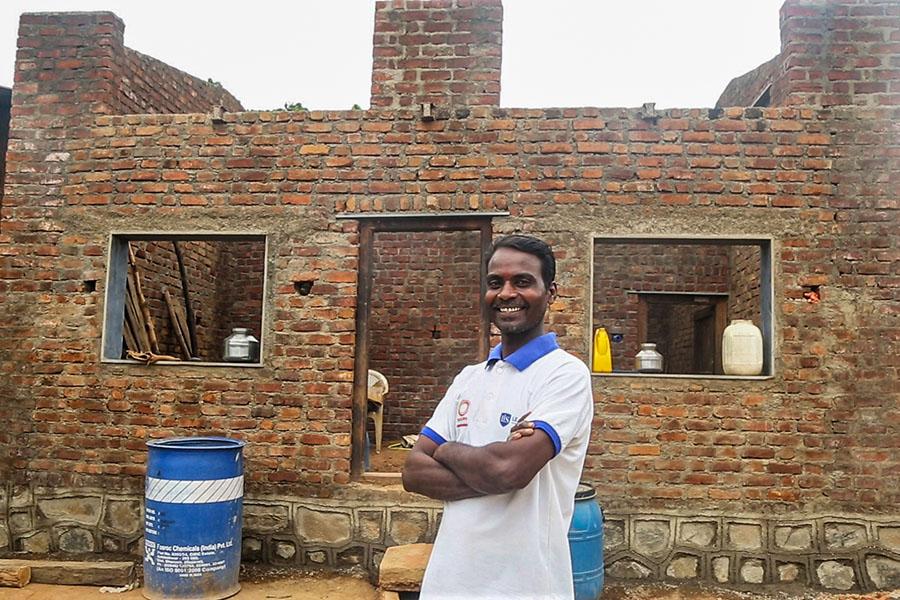Skilling: An opportunity to unlock India's youth potential
Here's why investing in skilled agents of change promises to bridge multiple gaps, creating a healthy, flourishing market and society in India
Santosh More, a young man from Raigad’s Sudhagad taluka, used to work as a daily wage worker on the farms in his village, earning less than Rs300 a day. When the demand arose, he would manage to find work as a labourer at construction sites and make approximately the same amount. When Santosh learnt of a skilling mobilisation meeting in his village (supported by Swades), he opted for a certified course in masonry. Today, he makes Rs800 a day and, perhaps as importantly, is a far more confident person.
With 254 million people between the age of 15-24 (UNPF State of the world population report, ‘23), many young men and women like Santosh can benefit from skilling programmes to pursue a dignified and fulfilling life. Often referred to as the ‘demographic dividend’, India’s youth can hugely contribute to India’s growth story—provided they are equipped with the right set of skills and training. Here’s why investing in skilled agents of change promises to bridge multiple gaps, creating a healthy, flourishing market and society.
Addresses the skill deficit
It is a fact that societies with higher skilled workforce adapt more effectively to changing economic landscapes and opportunities in job markets. Before the launch of the Skill India Mission in 2015, 4.7 percent of the workforce in India was formally skilled or trained compared to 52 percent in the US, 80 percent in Japan, and 96 percent in South Korea (National Policy for Skill Development and Entrepreneurship report).
Also Read- Rural youth: The demographic dividend we must invest in
The India Skills Report 2020 highlights that the youth employment rate has remained stagnant for the past three years. According to UNICEF and the Education Commission, more than 50 percent of Indian youth are off track and do not have the education and skills necessary for employment by 2030. The Covid-19 pandemic has made matters worse. The Pradhan Mantri Kaushal Vikas Yojana, Skill India Mission and so on are strides in the right direction to bring our youth up to speed. However, the mere size of the lacuna in the space offers much opportunity to civil institutions, corporates and governments to complement the efforts further.
Eliminates lack of education as a barrier
Education, as we all know, is a facilitator for a better life. However, in a country like India and many other developing countries, it is a privilege, often not accorded to many underserved communities. According to the data shared by the Ministry of Education (2023), the literacy rate in rural India is 67.77 percent compared to 84 percent in urban India. Skilling programs democratise opportunity and build aspiration by empowering the workforce—educated or not. It requires no existing large capital or prior training—only genuine curiosity and the willingness to learn. It offers a quicker return on investment, enabling youth to secure a job within months of training—helping them recover costs that they may have incurred for the training. In the case of a self-employment trade, one can expect prompter income augmentation post-training.
Also Read- Why India needs an effective skilling programme to combat unemployment
From masonry to plumbing and even accounting or data entry operation, one is free to choose the stream that appeals most to them. Besides, the programs instil soft skills, communication skills and above all, the confidence to face the future.
Curbs forced migration
Often in the case of rural youth, the migration to close-by metros is driven not by opportunity but by a fascination for the big city. This aspiration is not always backed by the right training. When young men and women land up in the big city without the necessary training, they end up in menial jobs, not necessarily building up to a sustainable career.
Often the move is forced because of the lack of a dignified alternative in the village. Skilling rural youth could curb forced migration and promote healthy migration—where one moves to pursue a better life. In my experience, youth that have successfully made a life in the village have invariably gone on to either inspire—if not employ—other local youth, thereby acting as local heroes that positively impact a generation.
Nurtures a healthy work environment
The informal sectors are the largest employment generators in India. Hence a majority of the workforce in the sector is also informally trained or self-taught. A formal skilling program offers youth proper placements and thus benefits, fairer wages, job security, the opportunity to branch out as an entrepreneur and so on. Even in the informal sector, they help them command a more equitable wage.
India, as an economy, is poised for growth. To nurture a dream of creating an equitable economy with fair and dignified livelihoods for all, it must begin with empowering our rural and urban youth or agents of change that can drive the transition—investing in skilling is one great way of doing just that.
The writer is the co-founder of the Swades Foundation & works full-time as its Managing Trustee & Director.
The thoughts and opinions shared here are of the author.
Check out our end of season subscription discounts with a Moneycontrol pro subscription absolutely free. Use code EOSO2021. Click here for details.

